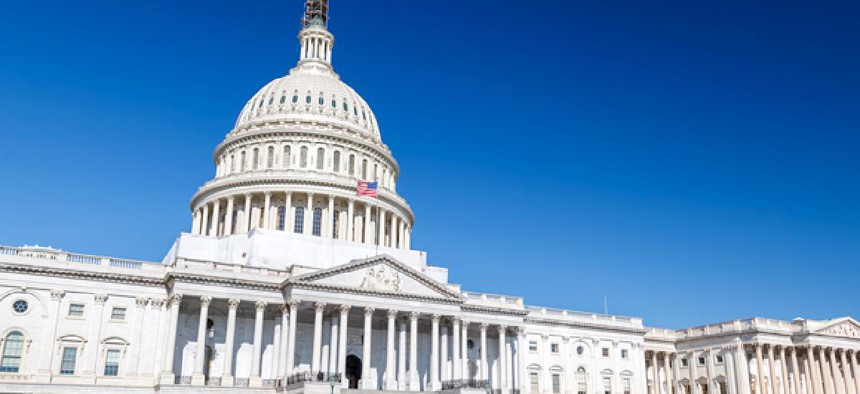
S.Borisov/Shutterstock.com
HHS responds slowly to GOP demands for Obamacare documents
House and Senate panels seek background on spending for P.R. and contractors.
Congressional Republicans, as part of their continuing opposition to the 2010 Affordable Care Act, have been demanding internal documents from the Health and Human Services Department, which has been slowly but not fully complying, congressional sources say.
The department’s hiring of contractors to help set up the law’s state health insurance exchanges as well as the engagement of public relations firms to promote the law’s benefits have prompted demands for greater transparency by two House committee chairmen and the ranking member of the Senate Finance Committee.
But HHS missed a Jan. 4 deadline for submitting documents on contractors engaged to help design the exchanges and to set up a “federal data services hub” to collect information on income and family characteristics to verify individuals’ submissions when they apply for coverage in the health insurance exchanges.
And documents relating to HHS-funded public relations campaigns, polling data and focus groups addressing the Affordable Care Act -- which Republicans had been requesting for months -- were finally subpoenaed in November by House Ways and Means Chairman Dave Camp, R-Mich., and Oversight Subcommittee Chairman Charles Boustany Jr., R-La. But they are arriving only slowly.
“We are continuing to receive information in accordance with the subpoena issued in the 112th Congress,” a Ways and Means spokeswoman told Government Executive on Thursday. “HHS is making a production on a rolling basis.”
HHS’ failure to meet the deadline for the state exchange contractor documents was confirmed by a spokeswoman for Sen. Orrin Hatch, R-Utah, and by a House Oversight staffer, who said the department has informed committee staff that they are preparing documents to reply. But there is no timeline.
HHS spokesmen did not respond to repeated requests for comment.
The law critics dubbed “Obamacare” has always been disputatious, beginning with its passage with no Republican votes, through the 2010 Republican takeover of the House, through the run-up to the Supreme Court’s June 2012 ruling largely upholding the law’s constitutionality, through the 2012 election campaign during which Republican candidates vowed to repeal it.
Hence it’s not surprising that HHS has been leery of discussing its strategy for implementation, and conservative commentators continue to decry the use of taxpayer funds to promote the law.
In April 2012, HHS awarded the public relations firm of Porter Novelli a $17.6 million contract to provide “technical professional services for strategic planning, development, execution, and assessment of a national, integrated multi-media education campaign that promotes the preventive health care benefits available to all Americans as a result of the Affordable Care Act.” That contract also targets “specific segments of the population,” so that same month HHS awarded a $1.4 million contract to a Los Angeles-based firm the Sensis Agency, to focus on outreach to Hispanics. And in June it awarded a $670,000 contract to the Alexandria, Va.-based Campbell & Co. to target the African American population.
In October 2012, HHS signed a $3.1 million contract with the public relations firm Weber Shandwick to, by April 2013, "promote early awareness and foster engagement with consumers to help them learn more about coverage that they may be eligible for,” according to PR Week.
Separately from HHS, a donation-supported private nonprofit called Enroll America, created by Ron Pollack, founding executive director of the health care advocacy group Families USA, has launched a campaign to promote acceptance of the law among individuals and businesses.
In issuing his subpoena last November, Camp complained about HHS’ “costly contracts to drive Internet traffic to pro-ObamaCare websites and produce television commercials promoting the administration’s positions. Government officials have also discussed using taxpayer funds to push prime-time television shows to add dialogue touting the health care law.” The Obama administration, he said, “has repeatedly stonewalled Congress and refused to allow a public review of how these tax dollars were spent. The lack of response leads me to believe that this administration is either unwilling to disclose why they are using taxpayer dollars to market their unpopular law or are unable to keep track of how those taxpayer dollars are being spent.”
Boustany added, “HHS serves as the administration’s mouthpiece spending millions of dollars to convince the American public this law is viable. HHS continues to present a misleading case that is inherently one-sided.”
Hatch and Issa, in their Dec. 20 letter to Sebelius, expressed concern about protection of citizens’ privacy. “Since the contractors chosen by HHS to administer the federal exchanges, the partnership exchanges and the associated federal data services hub will have access to tremendous amounts of sensitive and valuable information,” they wrote, “we want to ensure that HHS selects and expends funds on contractors in the best interest of federal taxpayers and health insurance consumers.”
A third front in the Republican attack on the health care law is being waged on the question of how to interpret the law’s ambiguous language on whether the tax credits for health insurance purchasers are legally available in states where the federal government has stepped in to set up an exchange because the state opted not to. Conservatives argue no, the Treasury Department argues yes. Issa on Wednesday said, "Transparency and accountability in the administration's implementation of the president's health care law will remain a major focus of the committee's efforts in the 113th Congress.”
(Image via S.Borisov/Shutterstock.com)







